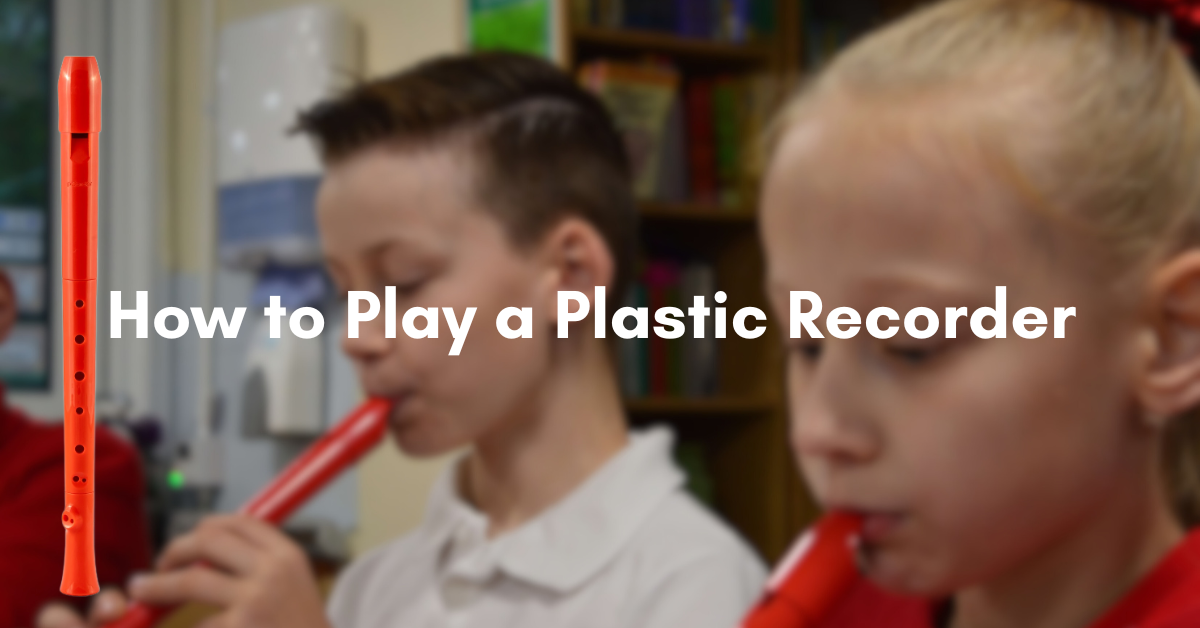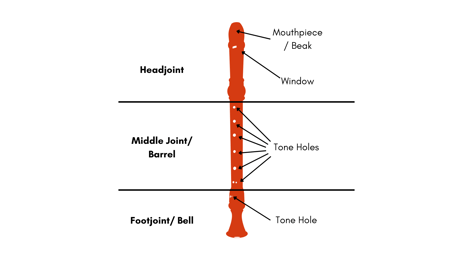
Recorders: the beginner instruments that can sound sweet with practice, but can also sound...screechy to begin with.
If you are a parent whose child is about to start playing the recorder, we understand that you might be preparing for the worst: ear plugs, or turning your garden shed into a panic room.
This would be a big mistake! Because although those first notes on a plastic recorder may sound sharp, with the right guidance and a little patience, you could be listening to some smooth, soothing tones before you know it. There are lots of reasons to learn to play the recorder, so let the musical experts from Warwick Music share some simple tips to help your child play a plastic recorder.
Tackle the basics of the recorder

First things first, let's take a closer look at the recorder and its parts. This handy diagram is a great way to demonstrate the different parts of a recorder to your child and will help you to understand the best way to hold your recorder.
Although recorders are simple to master, there are some key things to remember. Firstly, do not bite the recorder with your teeth! Children might be tempted to do this, but trust us: recorders aren't that nutritious.
Another key factor is that the left hand should always be closest to the mouth, with the right hand covering the tone holes towards the footjoint or bell of the recorder. This applies whether your child is left-handed or right-handed.
For more tips about mastering the basics of the recorder, check out our handy Learn to Play pCorder page.
Practice, practice, practice
It might seem obvious but practice really does make perfect. Yes, it may be a little noisy and first and hearing your little one play the same song over and over again may feel grating. But practise those early exercises and songs and suddenly their repertoire will expand.
Encourage your child to focus on playing slowly and steadily, with an emphasis on accuracy. Their music teacher should provide some basic pieces, to begin with: keep the focus on these simple songs and build up their confidence and muscle memory. Learning an instrument is tricky to begin with but the recorder is a popular choice for a reason. With practice, those first slow uncertain notes could build into something really special.
Discover the basics of musical theory
Another reason that teachers return to the recorder for their beginner lessons is that they provide an easy gateway into musical theory. If you are not musical, this may feel like an area where you cannot help your little learner. But there are lots of free resources available online, such as these printable worksheets, that can help you learn the basics with your child. Who knows, it might encourage you to take up a musical instrument yourself!
Encourage your child to play the recorder with friends
If the noise of one recorder wasn't enough for you, imagine a whole group of them! Although this might sound like a shortcut to a migraine, encouraging your child to play their instrument with their friends is a great way to develop their playing skills. It also encourages collaboration, builds their understanding, and can really aid their confidence...just be sure to warn the neighbours!
Sign up for extra recorder lessons and classes
If your child is learning to play a plastic recorder with their school class, this will probably give them a good grip on the essentials. There are specialist music teachers who can take this learning even further, and this can be an option for children who want to progress even further and faster. Along with researching online, ask your classroom music teacher or check out your local music store!
Try recording (the recorder!)
Your child may be a long way away from being a recording recorder artist, but quick audio recordings can really aid their practice. This can be as simple as a voice memo on a mobile phone. Encourage your child to listen back. What sounded good? What sounded like a mistake? This is also a really useful way of tracking their progress. Listening back to earlier recordings later down the line can provide milestones and give your mini-musician the confidence to keep on learning!
Choose the right recorder for your child
With so many different models of plastic recorders out there, choosing the right one can be difficult. Be sure to get the advice of teachers and music specialists, look at reviews, and decide on what areas are important to you. For your child, this might be how the recorder looks, but perhaps you are concerned about price or sustainability. Choosing a recorder that your child is comfortable with and enjoys playing will make learning the basics fun.
Encourage your child to learn from their mistakes and have fun!
Most importantly, remember to have fun! Giving your child positive feedback, understanding, and not wincing every time that they place 'Three blind mice' will help them to get the most out of learning to play an instrument. Even professional musicians make mistakes, and learning to play a plastic recorder might just be the making of another pro player!
- If you want to find out more about the basics of playing a recorder, be sure to check out the Learn to Play pCorder page. This area of our site will be continually updated with tips, resources and videos to get the most out of any plastic recorder, including pCorder, the world's first carbon-neutral and anti-microbial recorder.
- Check out our article to discover the difference between plastic and wooden recorders!
- pCorder is not simply a sustainable recorder: it also comes in a whole new type of eco-friendly packaging. Find out more about how we have redesigned recorder cases!
Adam is the Content Manager at pBone Music. This should mean that he’s the ideal person to write about himself, but he finds boasting in the third person a little awkward. He honed his word wizardry with a degree in English Language and Literature at the University of Leeds. He has since written copy for clients and businesses across the land, from awards to something beginning with “z”. He also spent a number of years as a musician. He has written pop songs and even jingles for kids, performed more first dances at weddings than you could shake a pBuzz at, and once played a gig for a pie company at The Etihad Stadium in Manchester. When he’s not reminiscing about those good old days, you might find Adam enjoying the football (although as an Everton fan, that can be difficult). He also loves spending time with his partner, Jen, and his family and friends, and sincerely hopes they feel the same way.